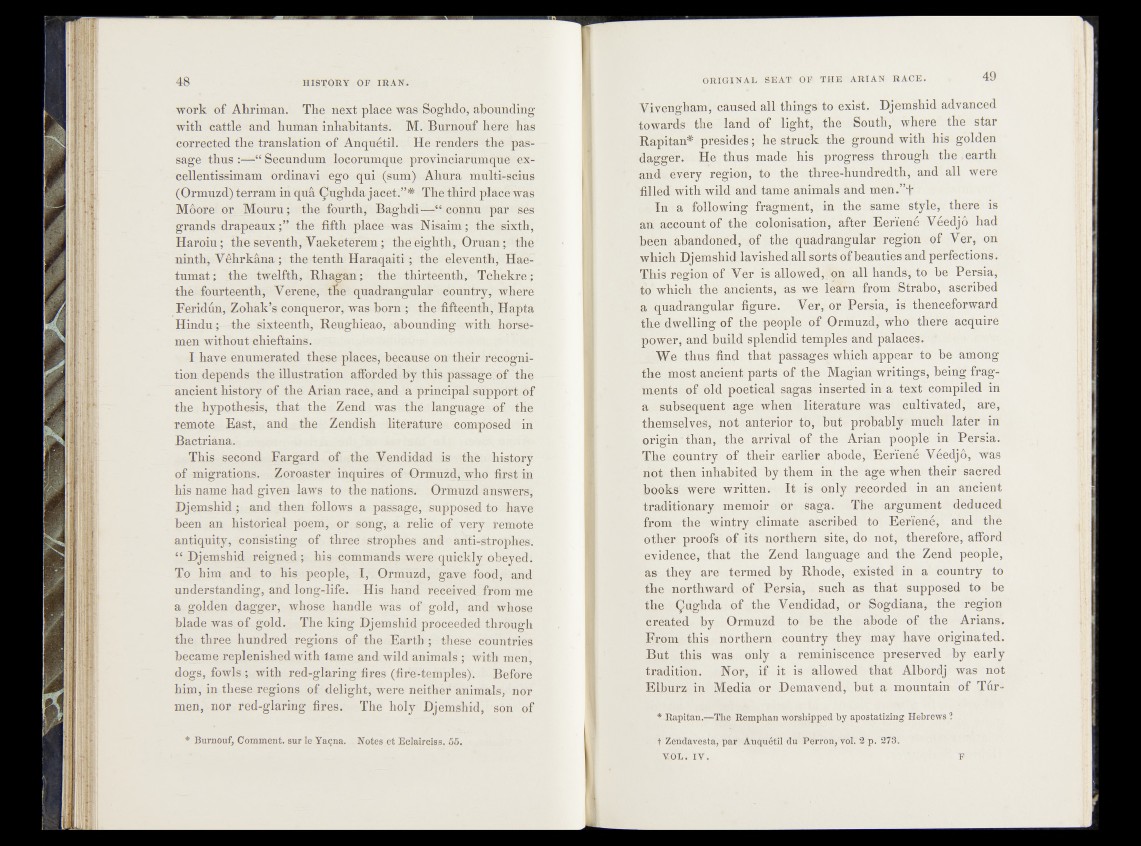
work of Ahriman. The next place wasSoghdo, abounding
with cattle and human inhabitants. M. Burnouf here has
corrected the translation of Anquitil. He renders the passage
thus Secundum locorumqiie provinciarumque ex-
cellentissimam ordinavi ego qui (sum) Ahura, • multi-scius
(Ormuzd) terram in qufi Qughda jacet.”# The third place was
Mbore or Mouru; the fourth, Baghdi —“ connu parfcfsls
grands drapeaux;” the fifth place was Nisaim; the sixth,
Haroiu; the seventh, Vaeketerem; the eighth, OrUan;| * the
ninth, Vbhrk&na ; the tenth Haraqaiti; the eleventh, Hale-
tumat; the twelfth, Rhagan; the thirteenth, Tchekre;
the fourteenth, Verene, the quadrangular country, where
Feridun, Zohak’s conqueror, was born ; the-fifteenth,' Hapta
Hindu-;—the sixteenth, Reughieao, abounding^ with horsemen
without chieftains.
I have enumerated these places, because on their recogni-
tion depends the illustration afforded by this passaged "the
ancient history of the Arian race,-and a principal support -of
the hypothesis, that the- Zend was the language of the
remote East, and the Zendish literature * composed in
Bactriana.
This second Fargard of the Vendidad is then history
of migrations. Zoroaster inquires erf Ormuzd;'who first in
his name had given laws to the nations:' Ormuzd:- ansWetS;
Djemshid; and then follows a passage, supposed to have
been an historical poem, or song, a relic of very remote
antiquity, consisting of three strophes and anti-strophes.
“ Djemshid reigned ; his commands were quickly obeyed.
To him and to his. people, I, Ormuzd, gave food, and
understanding, and long-life. His hand received from me
a golden dagger, whose handle was of gold, and whose
blade was of gold. The king Djemshid proceeded through
the three hundred regions of the Earth ; these countries
became replenished with tame and wild animals ; with men,
dogs, fowls; with red-glaring fires (fire-temples). Before
him, in these regions of delight, were neither animals, nor
men, nor red-glaring fires. The holy Djemshid, son of
* Burnouf, Comment, sur le Ya<jna. - Notes et Eclairciss. 55.
Yivengham, caused all thingsrto exist. Djemshid advanced
towards the land of light, the South, where the star
Rapitan# presides; he struck, the ground with his golden
dagger. HejthWs"fnade his progress through the,earth
and* ^vbry regji^^ Jtb tjafe ..three-hundredth, and all were
filled with wild and tame animals and men.”t
In a following fragment, in* the same style/, there if
an account of; tferi colonisation, after EerienAjVbedjd had
been abandoned, of 5 the /quadrangular region -of Ver, on
which Djemshid lavished all sorts ofbeauties and perfections.
-This’ region of Ver is allowed,Jon all handsjp® be Persia,
to. which the ancients, .as; we l'H n from Strabo, ascribed
a quadrangular figure. Ver/for Persia;,?isVithenceforward
Jth;e dwelling of the peoplexof .Ormuzd, who there acquire
power, and build splendid temples and palacds; *4
We thus find that-passagbe which appear to be among
tbe most ancient? parts of the Magian writings, being fragments
*©f old, poetical sagas inserted. in a textiCompiled in
a t&uhsequent age when I literature was - cultivated, are,
themMl^el^not anterior to, brft* probably much later in
kbrigin*than, the arrival oft the .Arian pbopie* in Petsiat
The country of their, earlier abod^piEeriene was
nii; then inhabited by them in thdlage when their sacred
books’ were written* It «.is only recorded fin an ancient
traditionary memoir or saga. The argument-deduced
from the wintry climate ascribed to Eeriene,’ and the
‘"'other proofs of its northern sitef/do, n:oi, Hherefo.re, afford
r evidence, that the Zend language and the Zend people,
as they are termed by Rhode, existed in ar country to
the northward of Persia, . such as that supposed to be
the Qughda; o f. the Vendidad, or Sogdiana, the region
created by Ormuzd to be the abode off'; the Arians.
From this. northern country .they may have originated.
But this was only a reminiscence, preserved by early
tradition. Nor, if it is allowed that Albordj was not
Eibutz in Media or Demavend, but a mountain of Tur-
’tRapitan.—The Remphan worshipped by apostatizing Hebrews ?
t Zendavesta, par Anquötil du Perron? yol. 2 p. 278.
V p i . IV. F